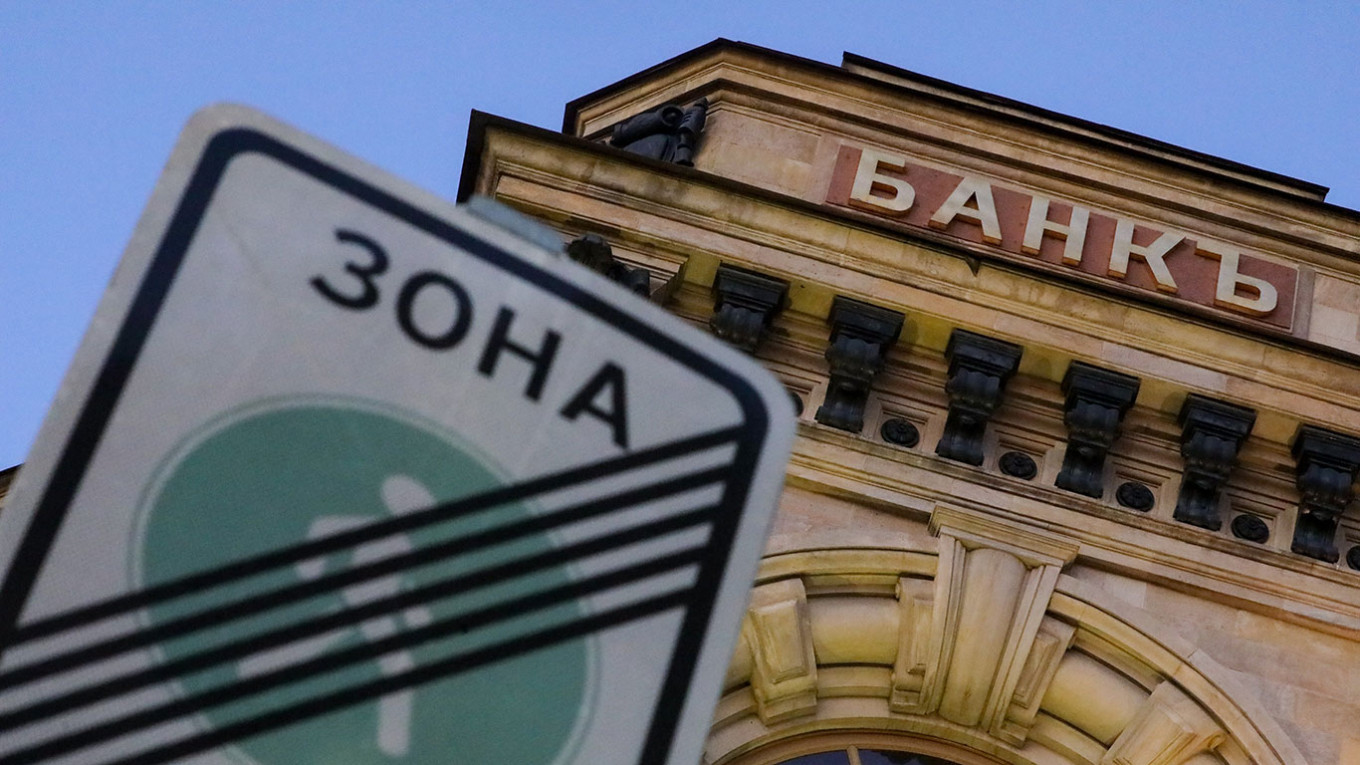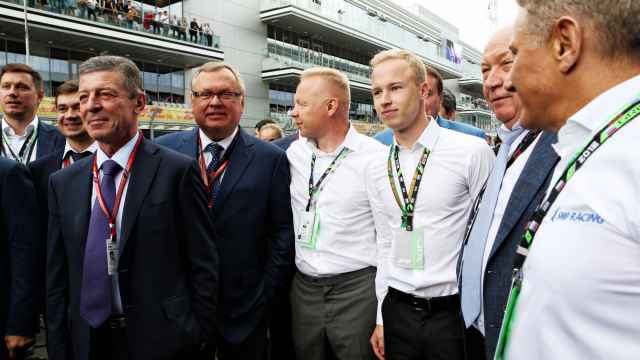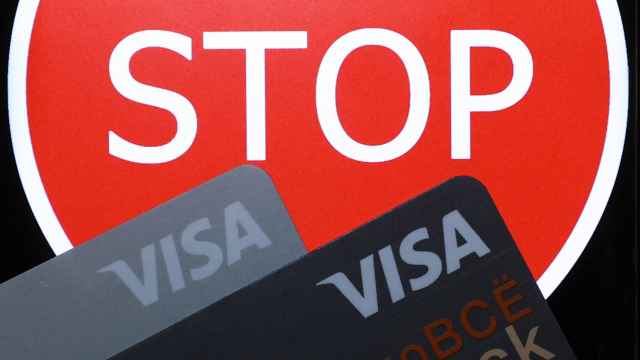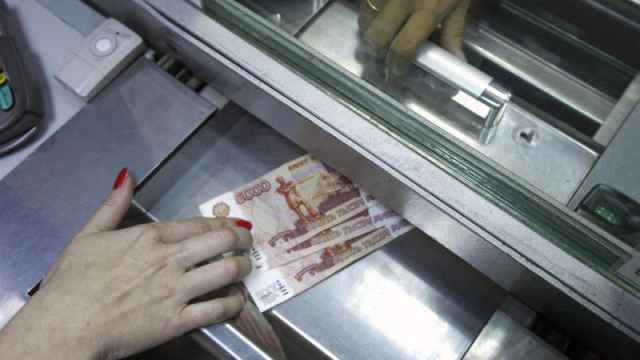The European Union on Wednesday cut seven Russian banks from the SWIFT payment system and banned Kremlin-controlled media outlets RT and Sputnik from broadcasting into the bloc.
The measures, effective immediately, were the latest ratcheting up of the Western-coordinated sanctions on Russia for its invasion of Ukraine, now in its seventh day.
"At the speed of light, the European Union has adopted three waves of heavy sanctions against Russia's financial system, its high-tech industries and its corrupt elite," European Commission chief Ursula von der Leyen said in a statement.
The cumulative punishment over the past week, also targeting Russian President Vladimir Putin, ministers and oligarchs supporting his rule as well as Russia's central bank, has already caused Russia's economy to buckle.
But so far there is no sign of it deterring Putin from an escalation of his war.
And EU officials said the sanctions — as well as Russian countermeasures — would inevitably also hit the bloc's economy, though to a lesser degree.
'Signal' to Putin
Wednesday's latest sanctions, signalled since the weekend, exclude listed banks from the global SWIFT interbank messaging network which allows for quick and secure transactions.
The list comprised Russia's second-biggest lender VTB Bank as well as Bank Otkritie, Novikombank, Promsvyazbank, Rossiya Bank, Sovcombank and VEB (Vnesheconombank), all of which were deemed to have direct financing links to Russia's war in Ukraine.
The list did not name Russia's biggest bank Sberbank or another significant one, Gazprombank, in order to allow EU countries to pay for Russian gas and oil deliveries.
But a senior EU official said the list would be kept "continuously under review" and could be changed according to "how the situation is evolving on the ground."
He added that, with cumulative earlier sanctions by G7 partners, "slightly more than 80% of the (Russian) banking system is subject to some sanctions," in the form of the SWIFT ban, asset freezes and financing sanctions imposed by the EU, the United States and Britain.
Switzerland — a major financial hub not in the EU — has indicated it would follow the EU sanctions.
The EU is also barring new EU investment in the Russian Direct Investment Fund and the supply of euro banknotes to anyone in Russia, except for personal use or diplomatic reasons.
"This is the largest sanctions package in our Union's history. Today's decision to disconnect key Russian banks from the SWIFT network will send yet another very clear signal to Putin and the Kremlin," von der Leyen said.
RT, Sputnik banned
Brussels also banned broadcasts by RT, formerly known as Russia Today, and Sputnik, both considered propaganda organs of the Kremlin parroting disinformation over what was happening in Ukraine.
"We are taking an important step against Putin's manipulation operation and turning off the tap for Russian state-controlled media in the EU," the bloc's foreign policy chief Josep Borrell said.
Von der Leyen added: "We will not let Kremlin apologists pour their toxic lies justifying Putin's war or sow the seeds of division in our Union."
The EU declared both the outlets "a significant and direct threat to the EU's public order and security" and said they were "essential and instrumental in bringing forward and supporting the aggression against Ukraine, and for the destabilisation of its neighboring countries."
It announced an immediate ban on their signals via satellite, cable, apps or the internet and a suspension of their licenses in the EU, specifically also targeting RT's subsidiaries broadcasting in English, German, French and Spanish.
Risks to EU
Officials warned the Russian war in Ukraine would be deleterious for the 27-nation EU, compounding problems already experienced with supply constraints, spiking energy prices and inflation.
"The Russian invasion will likely impact the eurozone's growth negatively," EU economy commissioner Paolo Gentiloni said, adding that the risks "shouldn't be under-evaluated."
"We can't exclude that a further factor of crisis can come in, for example gas supply conditions, financial consequences, or disruption of supply chains," he said.
The EU official speaking on the SWIFT sanctions said it was inevitable that blocking Russian banks from the system would "impact" the EU and Western countries.
But, he said, "that is understood and that is accepted."
A Message from The Moscow Times:
Dear readers,
We are facing unprecedented challenges. Russia's Prosecutor General's Office has designated The Moscow Times as an "undesirable" organization, criminalizing our work and putting our staff at risk of prosecution. This follows our earlier unjust labeling as a "foreign agent."
These actions are direct attempts to silence independent journalism in Russia. The authorities claim our work "discredits the decisions of the Russian leadership." We see things differently: we strive to provide accurate, unbiased reporting on Russia.
We, the journalists of The Moscow Times, refuse to be silenced. But to continue our work, we need your help.
Your support, no matter how small, makes a world of difference. If you can, please support us monthly starting from just $2. It's quick to set up, and every contribution makes a significant impact.
By supporting The Moscow Times, you're defending open, independent journalism in the face of repression. Thank you for standing with us.
Remind me later.






